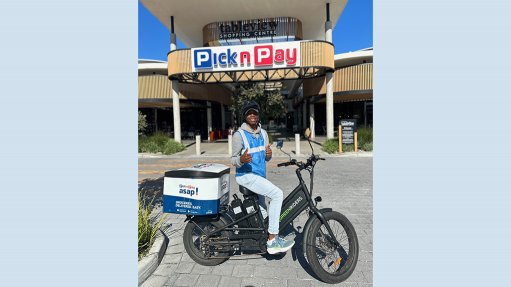
South African green, turnkey e-mobility solutions group Green Riders will expand its fleet of electric delivery bicycles from the current 200 units to 500 by the end of July, says founder and CIO Craig Atkinson.
This means that the Cape Town-based company will also need to train an additional 300 South African youths to become professional delivery riders within the Green Riders ecosystem.
This comes as the 15-month-old company has clinched fleet partnership deals with a number of aggregators such as Mr D (Takealot), Bolt Food, UberEATS, Pick n Pay, as well as online fashion platform, Bash.
Within the Green Riders ecosystem, riders are trained on how to operate an e-bike, as well as a number of other modules, such as rules of the road, customer etiquette and the use of a smartphone, with the latter three-month course offered by non-profit organisation Harambee Youth Accelerator.
Atkinson says riders within the group have the opportunity to own their delivery e-bikes, through a two-year rent-to-own scheme.
The cost of an e-bike is about R40 000.
Around 10% of the Green Riders fleet are female.
Riders keep their e-bikes at home. The two-battery e-bike can either be charged at home, at a Green Riders charging facility, or at designated partner charging stations and delivery pick-up points.
“The vision I had with Green Riders is not only to focus on zero-emission deliveries, but to also provide jobs to the South African youth,” says Atkinson.
“Of the roughly 50 000 delivery workers in South Africa, only 5% are South Africans, this while there is an incredibly high unemployment rate among the country’s youth.”
Green Riders’ e-bikes are assembled in Cape Town, largely from imported parts.
Atkinson says the company will soon move to larger premises, and is in talks with the Industrial Development Corporation and the Atlantis Special Economic Zone for space once the company reaches larger volumes.
“We want to establish a local battery ecosystem, plus cell assembly. This also means fast-charging technology, rather than swap-out technology.”
The current range is around 60 km per battery, which translates to 120 km on the dual-battery system currently employed.
Charging a single battery (1kW) takes between three to four hours, at a cost of around R2 per charge.
“By the end of the year, we want to have fast-charging in place,” says Atkinson.
In five years’ time, Atkinson and his investors hope to have scaled up the company to have 50 000 e-bikes and e-motorbikes on South African roads, all assembled locally.
The e-motorbikes will come from Kenya, with the homologation of the first unit set for this year already.